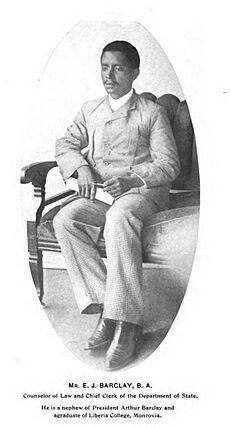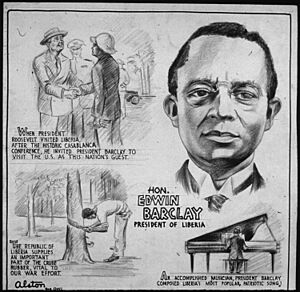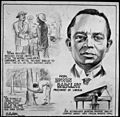Edwin Barclay facts for kids
Quick facts for kids
Edwin James Barclay
|
|
|---|---|
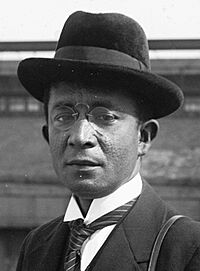 |
|
| 18th President of Liberia | |
| In office 3 December 1930 – 3 January 1944 |
|
| Vice President | James Skivring Smith, Jr. |
| Preceded by | Charles D. B. King |
| Succeeded by | William V. S. Tubman |
| 19th Secretary of State | |
| In office 5 January 1920 – 3 December 1930 |
|
| President | Charles D. B. King |
| Preceded by | Charles D. B. King |
| Succeeded by | Louis Arthur Grimes |
| Personal details | |
| Born | 5 January 1882 Liberia |
| Died | 6 November 1955 (aged 73) Liberia |
| Political party | True Whig |
| Spouse | Euphemia Barclay |
| Children | Three |
Edwin James Barclay (born January 5, 1882 – died November 6, 1955) was a Liberian politician, writer, and musician. He served as the 18th president of Liberia from 1930 to 1944. He was part of the True Whig political party, which was very powerful in Liberia for many years. During Barclay's time as president, Liberia became an important friend to the United States during World War II.
Contents
Early Life and Family
Edwin Barclay's grandparents moved from Barbados to Liberia in 1865. They were among a small group of immigrants from the Caribbean. These families shared a culture with English roots and a history with the Americo-Liberians. Edwin's father, Ernest Barclay, and his uncle, Arthur Barclay, both became important politicians in Liberia.
In 1901, when he was 19, Edwin wrote a patriotic song for Liberia called "The Lone Star Forever." Edwin Barclay and his wife, Euphemia, had three children. They also helped raise George Arthur Padmore, who later became Liberia's Ambassador to the U.S. Their children were Mary Barclay Dumbar, Siata Isabel Barclay, and Earnest Barclay.
Political Career
Edwin Barclay was a member of the True Whig Party, which was in charge of Liberia at the time. He worked as the secretary of state for President Charles D. B. King from 1920 to 1930.
He became President of Liberia in 1930. This happened after President King and Vice President Allen Yancy resigned. They had been accused of being involved in forced labor practices. Barclay was then elected president on his own in 1931.
Presidency (1930–1944)
Barclay took over as president to finish King's term. One of his first big decisions was to change a law from 1864. This law had limited what foreign businesses could do in Liberia. After he changed it, more agreements were made with investors from countries like the Netherlands, Denmark, Germany, and Poland.
Barclay is known for helping Liberia stay independent during some very difficult times. The country faced threats from powerful groups like the League of Nations, which included governments from Germany, Britain, and America. There were also diplomatic challenges from France and even an attempt by the Firestone Tire and Rubber Company to gain more control.
Dealing with Loan Payments
In 1926, the Liberian government had borrowed $5 million from a company connected to Firestone. This was part of a deal where Firestone got a large area of land to grow rubber.
The Great Depression in the 1930s caused big problems for Liberia. The price of rubber dropped very low. Even though Firestone had planted many rubber trees, it wasn't worth it to harvest the rubber. Without this money, Liberia's government income fell sharply.
By 1931, Liberia couldn't make its loan payments anymore. The government asked Firestone and the bank for a break, but they refused. The head of Firestone, Harvey Samuel Firestone, even tried to get the United States government to force Liberia to pay. But U.S. President Franklin D. Roosevelt refused to get involved in Liberia's internal affairs. He said that Firestone took a risk by investing in Liberia.
In 1932, Liberia's government passed a law to stop paying the Firestone loan until new terms could be agreed upon. The U.S. stopped its diplomatic relations with Liberia for a while.
Barclay asked the League of Nations for help. A group from the League suggested giving financial aid to Liberia. However, they wanted some conditions, like placing League officials in important positions within the Liberian government. Some European countries even wanted Liberia to become a "mandate," which would mean losing its independence.
Barclay and his team did not agree with these conditions. They felt it would take away Liberia's independence.
After Barclay put some of the League's suggestions into action, U.S. President Franklin Roosevelt started diplomatic relations with Liberia again in 1934. After three years of talks, an agreement was reached. Liberia was able to start making loan payments again with some help.
Liberia's Role in World War II
In 1937, President Barclay, under pressure from the United States, ended a business agreement with German investors. These investors were thought to have ties to the Nazi government in Germany. Barclay remained President until January 3, 1944, when William Tubman took over.
Why Liberia Was Important
When Japan took control of rubber-producing areas like Malaysia and Singapore during World War II, Liberia became very important. Its rubber plantations were one of the only places where the Allies (like the U.S.) could get natural rubber. Natural rubber was needed for many things, including tires for war planes, military vehicles, and radar equipment. Because of this, the demand for rubber went up, and prices soared.
Former U.S. Secretary of State Cordell Hull wrote that Liberia became "greatly increased importance" as a source of rubber. President Barclay promised the Americans that Liberia would provide all the natural rubber they needed for the war.
Defense Agreement with the United States (1942)
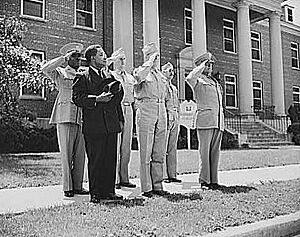
In 1942, Liberia signed a Defense Pact with the United States. This led to many improvements in Liberia, including new roads, airports, and other important buildings. Roberts International Airport was built with very long runways, long enough for large bombers to land. This made it one of the longest runways in Africa.
Supplying the War in North Africa
Getting war supplies to North Africa was difficult because German submarines controlled the North Atlantic Ocean. To move American soldiers and supplies, the United States needed a new route through South America and Liberia.
Because it was close to South America, Liberia became a key stopping point for air travel across the South Atlantic. The Liberian government allowed the U.S. to use its land to store war supplies and build military bases. American military supplies were gathered in Florida, sent through South America to Brazil, and then flown from Brazil to a military base at Roberts Field in Liberia. From there, the supplies were flown to places like Morocco, Tunisia, and Algeria.
President Roosevelt's Visit (1943)
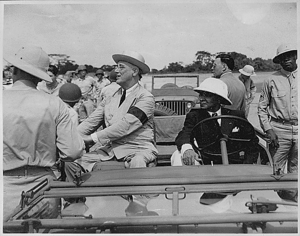
Liberia's importance to the war effort was clear when U.S. President Franklin D. Roosevelt visited Liberia in January 1943. He came after a meeting in Casablanca. Roosevelt wanted to set up U.S. military bases in Liberia, ensure Liberia kept supplying rubber, and convince Liberia to join the Allies against the Axis powers.
In May 1943, Edwin Barclay visited the United States. He was the first black person to be officially introduced as a guest of honor to the United States Congress.
Retirement
Barclay retired in 1944, and William Tubman became the new president. Barclay later ran against Tubman in the 1955 Liberian general election but did not win many votes. He passed away a few months later.
See also
- History of Liberia
- Americo-Liberians
- President of Liberia
Images for kids
 | Precious Adams |
 | Lauren Anderson |
 | Janet Collins |


